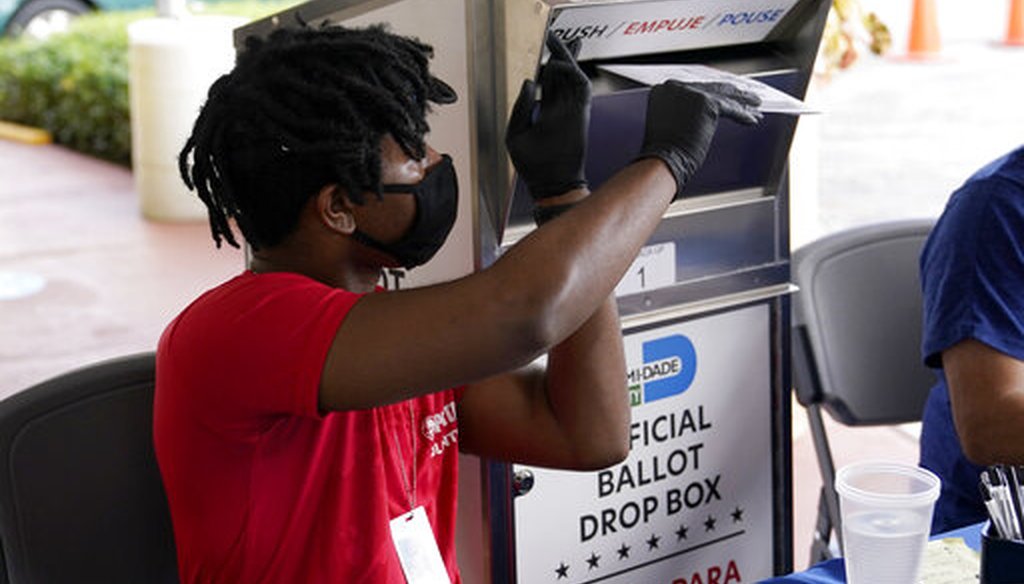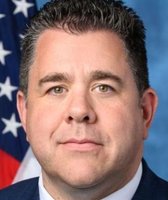Stand up for the facts!
Our only agenda is to publish the truth so you can be an informed participant in democracy.
We need your help.
I would like to contribute

Election worker Najeh Fisher places a vote-by-mail ballot for the Nov. 3 general election into an official ballot drop box at the Miami-Dade County Elections Department, Wednesday, Oct. 14, 2020, in Doral, Fla. (AP)
If Your Time is short
-
Ballot boxes have long been used by multiple states without controversy.
-
Trump and GOP allies have targeted litigation against more drop boxes in battleground states or places where some policies changed this year.
-
The California GOP set up its own ballot boxes, prompting a cease and desist order from the state attorney general.
In court briefs and on Twitter, President Donald Trump and GOP allies have fought ballot drop boxes as part of a war against voting by mail. But when the California GOP installed its own drop boxes, he gave them the thumbs up.
The Trump campaign and his allies have gone to court to try to limit the use of ballot drop boxes in key battlegrounds such as Ohio and Pennsylvania. Texas Gov. Greg Abbott has also been in a back-and-forth court battle to limit the number of ballot dropoff sites.
In California, the tables are turned. Officials there threatened the state GOP with legal action after reports that the party had set up its own ballot drop boxes. At least one box was improperly marked "official." Trump urged the Republicans to not back down.
"You mean only Democrats are allowed to do this? But haven’t the Dems been doing this for years? See you in court. Fight hard Republicans!" he tweeted in response to an Los Angeles Times article quoting state officials saying the GOP’s actions were illegal.
In August, Trump called drop boxes a "voter security disaster" and tried to cast doubt about their control.
Sign up for PolitiFact texts
But election experts say such aspersions are misleading, noting that drop boxes have been used in GOP and Democratic counties for many years, without incident. With less than three weeks before Election Day, the ongoing battles over returning ballots threaten to leave voters confused or doubtful about the integrity of the system.
"The Trump campaign seems to be focusing on filing so many lawsuits to try to create opportunities to sow doubt with the process in the minds of supporters," said Trey Grayson, a former Kentucky secretary of state and a Republican. "As a Republican, I worry that some of my fellow Republican voters won't use drop boxes because of this confusion. As a former election administrator, I worry that some voters won't use drop boxes because of this confusion."
We reviewed the status of litigation in a few key states and talked to election officials about why they are confident about the integrity of official ballot drop boxes.
Ballot drop boxes allow voters to bypass the mail service, which is under strain this year, to ensure their mail ballots are received on time. The boxes, often located outside of early voting sites or municipal elections offices, also allow voters who are social distancing amid the pandemic to avoid lines or crowds at indoor voting sites.
The Republican National Committee hasn’t challenged longstanding use of ballot drop boxes in many states such as Colorado, Florida and Utah. But the RNC has been involved in litigation in a couple of key states where some of the policies about ballot drop boxes or dropoff locations changed this year.
In Pennsylvania, a federal judge ruled against the Trump campaign’s effort to stop the use of ballot boxes, which were first used during the June 2 primary. The federal complaint said the boxes were "inadequately noticed and unmonitored" and that they "have increased the potential for ballot fraud or tampering." A federal judge, who had been appointed by Trump, dismissed the claims and concluded that the campaign hadn’t proven the burden of impending fraud.
In Ohio, the state passed a bill in March before the primary instructing boards of elections to "place a secure receptacle outside the office of the board for the return of ballots under this section." This summer, Republican Secretary of State Frank LaRose said state law prohibited more than one ballot box per county, prompting lawsuits by state Democrats and civil rights groups. The Trump campaign and the RNC intervened in a federal lawsuit seeking to block the expansion of ballot drop boxes. A federal appeals court sided with LaRose when it temporarily reinstated the one-location-per-county rule.
In Texas, voters who are allowed to vote by mail, including seniors and people with disabilities, can hand-deliver their completed ballot to county clerk’s offices on Election Day. (This is a separate process from drive-through voting.)
In July, Abbott issued a proclamation allowing voters to deliver ballots earlier than that. Most counties have only one clerk’s office, but a few large urban counties have multiple offices, opening up the possibility of providing multiple dropoff sites.
But on Oct. 1, the Republican governor issued a proclamation that limited dropoffs to just one site per county. That forced Harris County, home to more than 2 million voters in and around Houston, to shrink the number of dropoff sites from 12 to one, and set off a legal battle between the state and voting rights advocates.
"To force hundreds of thousands of seniors and voters with disabilities to use a single dropoff location in a county that stretches over nearly 2,000 square miles is prejudicial and dangerous," Harris County Clerk Chris Hollins wrote in a statement.
The conflict has led to split court decisions, with a federal appeals court upholding Abbott’s order while a state court in Travis County sided with plaintiffs who argued that local officials are in charge of elections.
In California, the state GOP set up its own ballot drop boxes at locations that requested them, such as churches and gun shops, as well as its own offices. California Attorney General Xavier Becerra and Secretary of State Alex Padilla, both Democrats, sent the party a cease-and-desist letter, stating that the GOP misrepresented the boxes as official and questioning whether they complied with state code. A photo showed that a box stated "official" on it. A lawyer for the GOP blamed the "official" sign on a volunteer and said the word was removed.
The California GOP argues that installing its own drop boxes is no different from ballot harvesting, the term for collecting ballots on behalf of others and delivering them to election officials. In 2016, California passed a law that allowed anyone, including paid workers, to collect and return ballots. Previously, only relatives or people living together could submit ballots for one another.
Becerra and Padilla said in a press conference Oct. 16 that the GOP had agreed to not have unstaffed and unsecured boxes, but reporters on the call told the officials that the GOP said it plans to continue using the boxes. (PolitiFact heard the same comment from Hector Barajas, a spokesperson for the California GOP.) The final outcome of the dispute appeared up in the air.
Ballot drop boxes have been in use for about two decades, said Amber McReynolds, CEO of the National Vote at Home Institute and the former head of elections in Denver. The boxes are commonly used in states where generally all voting is by mail, including in Republican-led Utah.
"Counties have added additional drop boxes almost every year since 2014," said Justin Lee, Utah’s director of elections. "We haven't had any security problems, and we have no indication that drop boxes favor one party over another party."
The National Conference of State Legislatures found eight states that have permanent laws that expressly allow drop boxes and include rules such as design features, number and location.
Far more states are using drop boxes this year, as elections coincide with a pandemic.
"At least 34 states have used or plan on using ballot drop boxes this year," Lawfare and the Stanford-MIT Healthy Elections Project said. "In the upcoming election, the use of drop boxes will likely be larger than in any election in American history."
Trump has cast doubt about the security of boxes. But a tip sheet from federal officials about best practices for ballot boxes said a drop box "provides a secure and convenient means for voters to return their mail ballot."
The officials recommended that boxes be locked at all times and accessible only by election officials. Ideally, unstaffed boxes should be located in areas with good lighting and video surveillance cameras.
Drop boxes are generally more secure than standalone mail boxes. They typically weigh more than 600 pounds and have tamper-proof mechanisms.
"They are tamper proof, bomb proof, fire proof and in many places equipped with cameras, or by government offices," said Wendy Weiser, a voting rights expert at the Brennan Center for Justice at New York University School of Law. "They have more security features than mailboxes do, and they are opened only by qualified election workers."
Our Sources
Lawfare Blog, The Rise of Ballot Drop Boxes Due to the Coronavirus, Aug. 27, 2020
CNN, Fact checking Trump's misleading suggestions that ballot drop boxes aren't secure, Aug. 18, 2020
Des Moines Register, Iowa counties can't set up drop box systems for absentee ballots, secretary of state says, Aug. 27, 2020
Philadelphia Inquirer, The Trump campaign is suing Pennsylvania over how to run the 2020 election, June 29, 2020
AP, Ballot Drop Boxes Seen as a Way to Bypass the Post Office, Aug. 18, 2020
Center for Tech and Civic Life, CTCL Partners with 5 Wisconsin Cities to Implement Safe Voting Plan, July 7, 2020
Washington Post, More states are using ballot drop boxes for absentee voters, but the boxes are already drawing skepticism, Aug. 6, 2020
Politico, California Republicans spark national feud over 'harvesting' ballot boxes, Oct. 15, 2020
Austin American Statesman, Appeals court allows Abbott to close multiple ballot drop-off sites, Oct. 13, 2020
Texas Gov. Greg Abbott, Proclamation, July 27, 2020
Harris County Clerk Chris Hollins, Statement: Governor Abbott Rolls Back Voter Access in Harris County, Oct. 1, 2020
WHYY, Judge rejects Trump lawsuit over Pa. ballot drop boxes, Oct. 10, 2020
Cleveland.com, Federal appeals court reinstates Ohio ballot drop box limit while case is reviewed, Oct. 9, 2020
New York Times, The Fight Over Absentee Ballots Intensifies Around Drop Boxes, Oct. 13, 2020
Attorney General Becerra and Secretary of State Padilla, Cease and Desist Letters on Ballot Drop Boxes, Oct. 12, 2020
Email interview, Mandi Merritt, Republican National Committee spokesperson, Oct. 14, 2020
Email interview, Maggie Sheehan, spokesperson, Office of the Ohio Secretary of State, Oct. 13, 2020
Email interview, Ellen Lyon, spokesperson Pennsylvania Department of State, Oct. 15, 2020
Email interview, Elizabeth Lewis, spokesperson for Chris Hollins, Harris County Clerk, Oct 16, 2020
Email interview, Trey Grayson, former Kentucky Secretary of state and former president of the National Association of Secretaries of State and current managing director of CivicPoint, Oct. 16, 2020
Telephone interview, Wendy Weiser, director of the democracy program Brennan Center for Justice at NYU school of law, Oct. 15, 2020
Telephone interview, Max Feldman, counsel at Brennan Center for Justice at NYU school of law, Oct. 16, 2020
Email interview, Amber McReynolds, CEO | National Vote at Home Institute & Coalition, Aug. 17, 2020
Telephone interview, Hector Barajas, a spokesperson for the California GOP, Oct. 17, 2020
Email interview, Justin Lee, Utah director of elections, Oct. 14, 2020









































